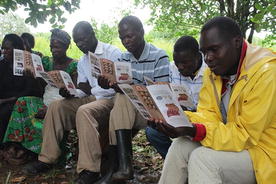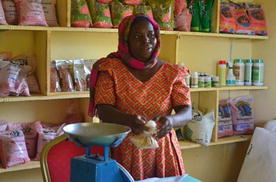Sowing Legume Seeds, Reaping Cash
A Renaissance within Communities in Sub-Saharan Africa


Open Access This book is licensed under the terms of the Creative Commons Attribution 4.0 International License (http://creativecommons.org/licenses/by/4.0/), which permits use, sharing, adaptation, distribution and reproduction in any medium or format, as long as you give appropriate credit to the original author(s) and the source, provide a link to the Creative Commons license and indicate if changes were made.
The images or other third party material in this book are included in the book's Creative Commons license, unless indicated otherwise in a credit line to the material. If material is not included in the book's Creative Commons license and your intended use is not permitted by statutory regulation or exceeds the permitted use, you will need to obtain permission directly from the copyright holder.
Photo Credits
David Okello Kalule (1st cover photo)
Justin Ndichu (2nd cover photo)
Agathe Diama
Eleanor Manyassa
This Springer imprint is published by the registered company Springer Nature Singapore Pte Ltd.
The registered company address is: 152 Beach Road, #21-01/04 Gateway East, Singapore 189721, Singapore


Interviewees in Tanzania, Uganda, Nigeria, and Ghana
We express our gratitude to different actors who accepted to share their valuable experience of Tropical Legumes projects.
Impact Story Collection
We thank the communication people who contributed in gathering information from the field. We acknowledge the contribution of Justin Ndichu, a communication consultant who helped to put together the impact stories in Tanzania; Eleanor Manyasa, a communication Intern at ICRISAT, who gathered the impact stories in Uganda, and Agathe Diama, head of communication, ICRISAT-Mali for collecting impact stories from Nigeria and Ghana.
We greatly acknowledge the valuable contributions of Justin, Eleanor, and Agathe who have been instrumental in gathering the various reported impact stories in this book. Without the collaboration of these colleagues, it could have been challenging to deliver on this book.
Field Facilitators
We are thankful to the following people for their field support: Dr. Omari Mponda and team at the Tanzania Agricultural Research Institute-Naliendele (TARI-Naliendele); Michael Kilango and team at TARI-Uyole; Ms. Edith Kadenge and team at TARI-Selian; Dr. David Okello Kalule and team at the National Semi-Arid Resources Research Institute (NaSARRI) in Uganda; Dr. Stanley Nkalubu and team at the National Crops Resources Research Institute (NaCRRI) in Uganda; Dr. Oteng-Frimpong Richard and team at the Ghana Savanah Agricultural Research Institute (SARI) in Ghana; and Prof. Candidus Echewku and team at the Institute of Agricultural Research (IAR) in Nigeria.
Language Edits and Proofreading
We acknowledge the contributions of ICRISAT communication team.
The Tropical Legume projects transforming the lives of the under-served majority along the commodity value chains in the drought-prone areas
is Seed Systems scientist with expertise in plant production, seed systems, innovation studies, participatory action research, and multi-stakeholder processes. He graduated from Wageningen University, the Netherlands. His 15 years experiences in agricultural research for development covered improved seed access facilitation for smallholder farmers, connection between biophysical, social, and institutional landscapes, participatory technology development, innovation platform support, and capacity building for farmers’ organizations. He earned several academic awards that permitted him to pursue graduate studies (Research grant within the Convergence of Science Strengthening Agricultural Innovation Systems (CoS-SIS) in 2008, Research grant as part of the Convergence of Science for better Management of Crops and Soils (CoS) Project DGIS in 2005, Research grant as part of the Cowpea Project, Bénin, NWO-FAO in 2003). Dr. Akpo has authored over 15 publications including peer-reviewed papers, books, and conference papers.
graduated from Okayama University, Japan. He is a Senior Scientist in Legume Breeding, Global Coordinator of Tropical Legumes III, HOPEII, and AVISA projects (funded by Bill & Melinda Gates Foundation), Cluster of Activities Leader on Science of Scaling Seed Technologies in the CGIAR Research Program (CRP) on Grain Legumes and Dryland Cereals, and Theme Leader of Seed Systems in the Global Research Program on Genetic Gains, ICRISAT. He has more than 60 peer-reviewed international publications and has delivered numerous oral and posters presentations in numerous international meetings. Dr. Ojiewo’s research work focusses on basic, applied, and adaptive research and development activities aimed at raising farm productivity, nutrition, and income security for resource-poor smallholder farm households, especially women and youth in rural and peri-urban semi-arid tropics. With expertise in plant breeding and seed systems, he has done extensive work in the development and dissemination of high-yielding and stress (biotic and abiotic)-resilient varieties of vegetables and legumes with farmer- and market-preferred traits together with accompanying integrated crop management practices and efficient seed and technology dissemination systems. Besides promotion of vegetable-legume-cereal-livestock-based family garden intensification systems, improving productivity and profitability for smallholder farmers, gender equity, youth empowerment, nutrition security, knowledge sharing, and solving the perpetual problem of food and nutritional insecurity of the less privileged in developing countries are core to his sense of purpose.
graduated from the Ahmadu Bello University, Zaria, Nigeria, in 2010. He is a Seed System specialist at the International Institute of Tropical Agriculture (IITA), Kano Station. He has more than 74 peer-reviewed international publications and has delivered numerous oral and poster presentations in numerous international meetings. Dr. Omoigui was an Associate Professor of Plant Breeding and Genetics at the University of Agriculture Makurdi from 2013 to 2016. He received several awards, among which are Most Outstanding Researcher in the University of Agriculture Makurdi in 2012, Excellent Research contribution to West African Cowpea Consortium in 2015, and Arthur Anderson Honour List Award for Best Graduating Student in 1999.
is a CIAT Senior Scientist based in Arusha, Tanzania. He focuses on seed systems research and development, technology transfer, and research product commercialization. For more than 30 years, he has contributed/led several research and development initiatives in various agricultural research areas including participatory crop research (both on station and on farm), testing agricultural technologies, and partnership to commercialize and scale up these proven technologies. For the last 15 years, he has been leading public–private multisectoral and multidisciplinary teams developing and deploying sustainable and impact-oriented bean seed systems to serve more than 27 million of smallholder farmers (58% being women) across several member countries of the Pan Africa Bean Research Alliance. Jean Claude has extensively published several articles, books, and book chapters on bean seed systems and technology transfer.
is Research Program Director of Genetic Gains and Director of the Center of Excellence in Genomics and Systems Biology at ICRISAT. He has more than 15 years research experience in international agriculture. Before joining ICRISAT in 2005, he worked at IPK-Gatersleben, Germany, for five years. While working at ICRISAT, in his dual appointment for six year, he also served CGIAR Generation Challenge Program as Theme Leader. Varshney is recognized as a leader in applied genomics, genomics-assisted breeding, and translational genomics for agriculture. He has genome sequences of 9 crops including pigeonpea, chickpea, peanut, and pearl millet and several molecular breeding products in chickpea, peanut, and pigeonpea to his credit. Varshney is an elected Fellow of Leopoldina—German National Academy of Sciences, American Association of Advancement in Sciences (USA), the World Academy of Sciences, Crop Sciences Society of America, American Society of Agronomy, and all 4 leading science academies of India: Indian Academy of Sciences, Indian National Science Academy, the National Academy of Sciences, and National Academy of Agricultural Sciences. He provides leadership by serving as member/chair for several committees, editorial boards, funding organizations, and advisory boards in international agriculture research, development, and capacity building.